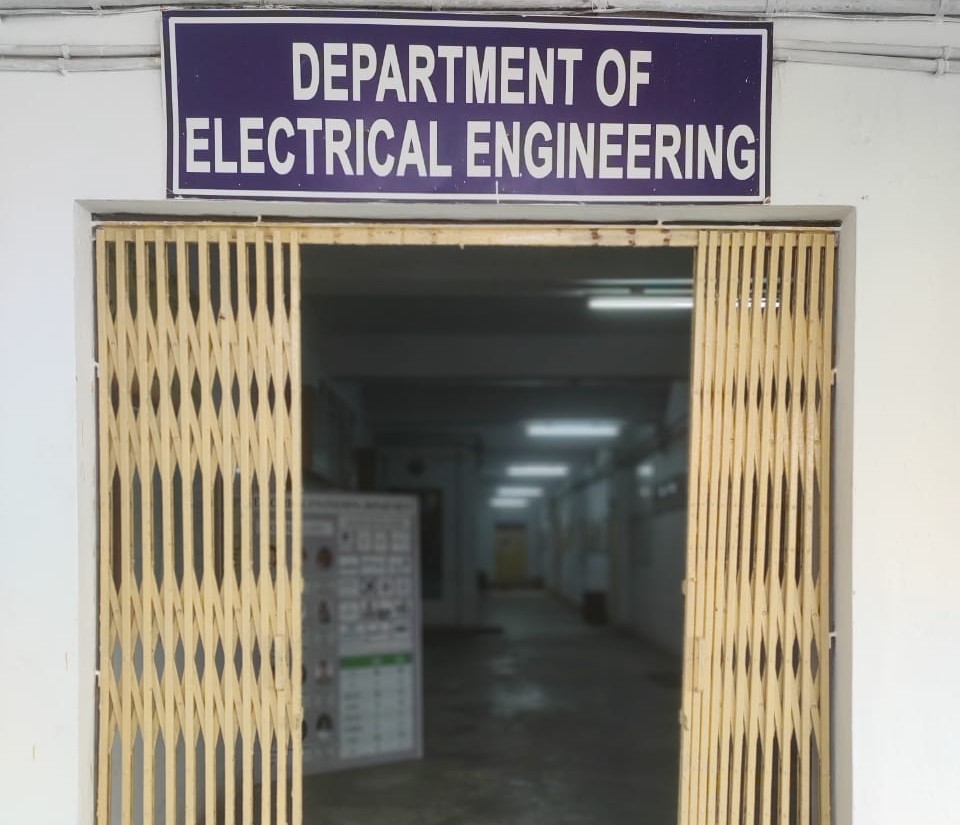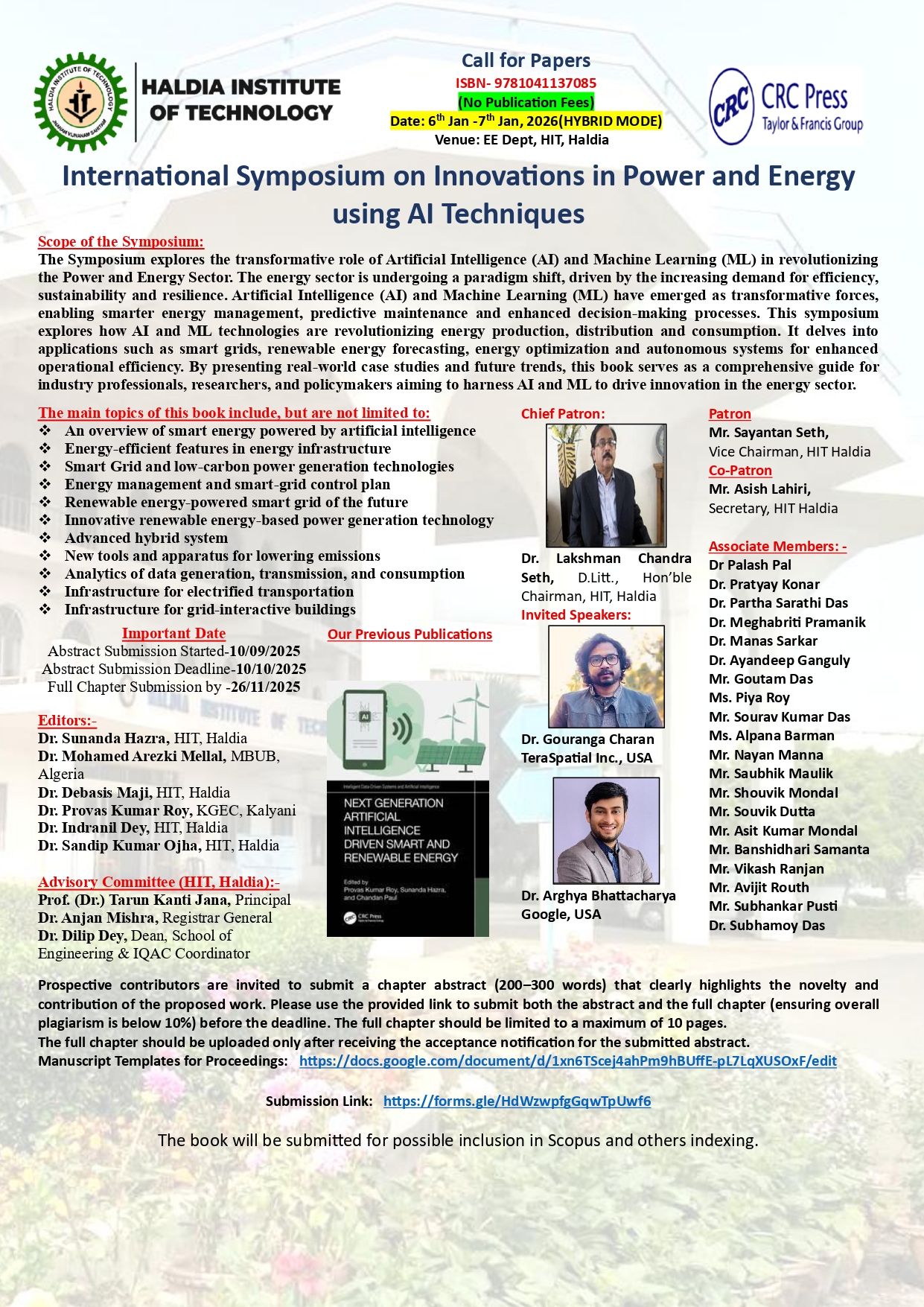Choosing the Electrical Engineering Department at Haldia Institute of Technology is a decision that opens the door to a world of unparalleled opportunities and personal growth. Our department boasts a team of accomplished professors and industry experts who are dedicated to your success. Their expertise spans a wide range of specializations, ensuring that you receive top-notch education and mentorship.
Haldia Institute of Technology
Welcome to the Electrical Engineering Department of Haldia Institute of Technology
Where curiosity knows no bounds, innovation knows no limits, and your journey to becoming an exceptional engineer begins.





















Why choose us
Our principles
Achievements
Why choose us
Our principles
Our principles drive our identity at the Electrical Engineering Department, Our College. We value academic rigor, promoting innovative thinking, collaborative engagement, and unwavering ethics. Experiential learning empowers students to bridge theory with practice, while diversity enriches our inclusive environment. Continuous growth, research excellence, and a global perspective shape our approach.
Achievements
Our achievements at the Electrical Engineering Department, Our College, shine brightly. From impactful research, industry collaborations, and student triumphs in competitions to cutting-edge facilities and alumni success stories, our journey reflects excellence. Engaging community outreach, esteemed faculty, and innovative curriculum further enhance our legacy. These achievements underscore our commitment to shaping adept engineers and making lasting contributions to the field.
Vision
Mission
Vision
To be a forerunner in Electrical Engineering education, research and profession and will facilitate the growth of Electrical Engineering graduates with dynamic capabilities of accepting new challenges
Mission
M1: The primary mission of the Department of Electrical Engineering is to produce quality human resource with capacity to serve the fraternity in a wide variety of roles including science, engineering, teaching, research, entrepreneurship and management.
M2: Putting emphasis on areas such as communication skills, professional and ethical responsibility, lifelong learning and contemporary issues to complement the technical aspects of the engineering course.
M3: To ensure combination of engineering and complementary course works in the curriculum so that Electrical Engineering graduates are well-rounded, able to work effectively in team settings and able to adapt to different work environments.
PEOs
PSOs
POs
PEOs
PEO1: Graduates will demonstrate a strong foundation in science, mathematics and electrical engineering essential for building progressive careers in industry and higher education.
PEO2: The graduates will be able to exhibit professional ethics, human values and eagerness to become contributors to the society through their problem-solving skills and technical capability.
PEO3: Graduates will be able to exhibit their knowledge and technical skills to provide innovative, safe and sustainable solutions to practical problems in their field of work.
PEO4: Graduates will engage themselves in lifelong learning and continued professional development by acquiring new skills.
PSOs
PSO1: Graduates will acquire the concepts of electrical engineering to develop the logical and technical skills for solving practical problems in the areas of Power System and Electrical Drives.
PSO2: Graduates will develop the ability to relate the theoretical concepts to practical applications through laboratory experiments using appropriate hardware setups and associated software utilities.
PSO3: Graduates will cultivate innovative ideas in the field of Electrical Engineering as well as multidisciplinary areas to make significant contributions to society.
POs
PO 1: Engineering Knowledge: Apply the knowledge of mathematics, science, engineering fundamentals, and an engineering specialization to the solution of complex engineering problems.
PO 2: Problem Analysis: Identify, formulate, review research literature, and analyze complex engineering problems reaching substantiated conclusions using first principles of mathematics, natural sciences, and engineering sciences.
PO 3: Design/ development of solutions: Design solutions for complex engineering problems and design system components or processes that meet the specified needs with appropriate consideration for the public health and safety, and the cultural, societal, and environmental considerations.
PO 4: Conduct investigation of Complex Problem: Use research-based knowledge and research methods including design of experiments, analysis and interpretation of data, and synthesis of the information to provide valid conclusions.
PO 5: Modern Tool Usage: Create, select, and apply appropriate techniques, resources, and modern engineering and IT tools including prediction and modeling to complex engineering activities with an understanding of the limitations.
PO 6: The engineer and Society: Apply reasoning informed by the contextual knowledge to assess societal, health, safety, legal and cultural issues and the consequent responsibilities relevant to the professional engineering practice.
PO 7: Environment and sustainability: Understand the impact of the professional engineering solutions in societal and environmental contexts, and demonstrate the knowledge of, and need for sustainable development.
PO 8: Ethics: Apply ethical principles and commit to professional ethics and responsibilities and norms of the engineering practice.
PO 9: Individual and Team Work: Function effectively as an individual, and as a member or leader in diverse teams, and in multidisciplinary settings.
PO 10: Communication: Communicate effectively on complex engineering activities with the engineering community and with society at large, such as, being able to comprehend and write effective reports and design documentation, make effective presentations, and give and receive clear instructions.
PO11: Project management and finance: Demonstrate knowledge and understanding of the engineering and management principles and apply these to ones own work, as a member and leader in a team, to manage projects and in multidisciplinary environments.
PO 12: Life-long learning: Recognize the need for, and have the preparation and ability to engage in independent and lifelong learning in the broadest context of technological change.
PAC
DAB
DAC
PAC

DAB

DAC

Need a professional consultation?
Contact Us Today
High level of competence in Haldia Institute of Technology
Our experience will help you create a impact in the industry
Electrical Engineering department in Haldia Institute of Technology has consistently delivered excellence in the field of innovation and success. Our placement record has showed that the desire to achieve success is possible with our department.
Why choose Electrical Engineering in Haldia Institute of Technology?
Here's how things are going to change for your business
- Electrical engineering in Haldia Institute of Technology offers a wide range of applications, from renewable energy and telecommunications to robotics and automation.
- In a technology-driven world, electrical engineering skills are in demand worldwide, opening doors to international opportunities.
- It's a field where innovation thrives, enabling you to contribute to groundbreaking technologies and advancements
- Electrical engineers tackle real-world challenges, honing critical thinking and creative problem-solving skills.
- Graduates enjoy a plethora of career options in industries such as energy, electronics, telecommunications, and aerospace.

Electrical Engineering Department of Haldia Institute of Technology - Recruiters









